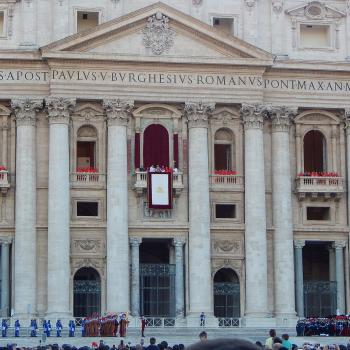A participation in the Triune community of God: "We cannot live as spectators of the dance of the Trinity. A hand reaches out to pull us into the Trinitarian actions of holy creation, holy salvation and holy community . . ." (46). "There are no nonparticipants in a Trinity-revealed life . . . God is never a nonparticipant in what he does. He does not separate himself from his community by ranks of angel-secretaries through whom we have to arrange an audience" (305).
We began by wondering if there was any relevance to our everyday lives in this abstract doctrine called the Trinity. It turns out the Trinity is a personal, participatory reality that threatens to bring God a little too close for comfort.
Theological Tune-Up
The belief in the Trinity is the theological cornerstone of Roman Catholicism, Eastern Orthodoxy, and traditions that have arisen from the Protestant Reformation. Among those rejecting the notion of the Trinity are Jehovah's Witnesses, Mormons, and Unitarians. The doctrine of the Trinity was articulated in response to the beliefs of Arius in the 4th century who insisted that the Son was a created being and did not share the full divinity of the Father. Worked out at the Council of Nicaea in 325, what has come to be known as the doctrine of the Trinity affirmed that God is three persons (hypostases) but one substance (or essence) (homoousion). God does not simply take different forms. Nor are there three Gods. There is one God in three persons. They are equal in power, eternity, and wisdom.
In describing Jesus, the Nicene Creed says, "And we believe in one Lord Jesus Christ, the Son of God, begotten of the Father (the only-begotten; that is, of the essence of the Father, God of God), Light of Light, very God of very God, begotten, not made, being of one substance with the Father." In the late 6th century (589), the Latin-speaking churches of Western Europe added the words "and the Son" (Filioque) to the description of the procession of the Holy Spirit. Eastern Churches have historically disagreed with that addition.
In his classic work A Manual of Christian Doctrine, Louis Berkhof notes that God is one in his essential being, but in this one being there are three persons, called Father, Son, and Holy Spirit. These three persons are modes or forms in which the divine essence exists. The real mystery of the Trinity consists in this: that the three persons are one in their essential being. The divine essence is not divided into thirds. It is wholly present in each of the three persons. The persons are not subordinate to one another in their essential being.
The doctrine of the Trinity is not explicitly articulated in scripture, but hints of all three occur in the Old Testament. For example, in Genesis 1:26 and 11:7 God speaks of himself in the plural. The angel of Jehovah is represented as a divine person (Gen. 16:7-13, 18:1-21, 19:1-22) and the Spirit is spoken of as a distinct person in Isaiah 48:16 and 63:10. Also see Isaiah 42:16, 61:1, and 63:9, 10 for passages in which three persons are indicated. In the New Testament, there are several passages in which the three persons are expressly mentioned, as in connection with the baptism of Jesus (Lk. 3:21-22), in the farewell discourses of Jesus (Jn. 14-16), in the great commission (Mt. 28:19), in the apostolic blessing (2 Cor. 13:13), and in such passages as Luke 1:35, 1 Corinthians 12:4-6, and 1 Peter 1:2. (See A Manual of Christian Doctrine, 76-77.)
The Distinctive Property of the Father
The Father generates the Son from all eternity.
The Distinctive Properties of the Son
- His eternal generation. By means of this generation the Father does not call the essential nature of the Son into being, but becomes the cause of the personal subsistence of the Son, a second mode of existence, within the divine being. This generation of the Son should not be regarded as an act completed in the past, but as a necessary and eternal act of the Father. It is timeless, always continuing, and yet ever complete.
- His divinity.
- His works. All things are out of the Father, but they are through the Son. The Father is the final cause of both creation and redemption. The Son is the mediating cause. All things are created and maintained through the Son. He is the light which lighteth every man (sic) coming into the world. The work of redemption is carried out by the Son in His incarnation, sufferings, and death (Eph. 1:3-14) (A Manual of Christian Doctrine, 79-80).
The Holy Spirit
The Holy Spirit is not just the influence of God or some abstract principle. The Spirit is designated as a person with personal attributes such as intelligence (Jn. 14:26, 15:26; Rom. 8:16), affections (Is. 63:10; Eph. 4:30), and will (Acts 16:7; 1 Cor. 12:11). The Spirit speaks, searches, testifies, commands, reveals, strives, and intercedes (Gen. 1:2; 6:3; Lk. 12:12; Jn. 14:26, 15:26, 16:8; Acts 8:29, 13:2; Rom. 8:11; 1 Cor. 2:10, 11). The Spirit's special task is to bring the work of God to completion both in creation and redemption. The Spirit inspires and qualifies people for special tasks in the Old Testament (Ex. 28:3, 31:2, 3, 6, 35:35; 1 Sam. 11:6, 16:13, 14. In the New Testament the Spirit prepares and qualifies Christ for his redemptive work (Lk. 1:35; 3:22). The Spirit inspires scripture (1 Cor. 2:13; 2 Pet. 1:21), forms and augments the Church, and dwells in it as the principle of a new life (Eph. 1:22, 23, 2:22; 1 Cor. 3:16, 12:4ff). The Spirit teaches and guides the Church, leading it in all truth (Jn. 14:26, 15:26, 16:13, 14; Acts 5:32; Heb. 10:15; 1 Jn. 2:27) (A Manual of Christian Doctrine, 82).




